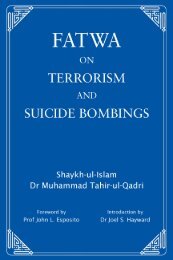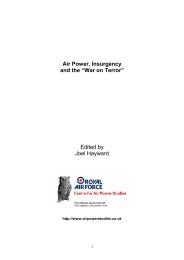Air Power, Insurgency and the âWar on Terrorâ - Prof. Joel Hayward's ...
Air Power, Insurgency and the âWar on Terrorâ - Prof. Joel Hayward's ...
Air Power, Insurgency and the âWar on Terrorâ - Prof. Joel Hayward's ...
You also want an ePaper? Increase the reach of your titles
YUMPU automatically turns print PDFs into web optimized ePapers that Google loves.
Chapter 3<br />
The attenti<strong>on</strong> of <str<strong>on</strong>g>the</str<strong>on</strong>g> UN was unwelcome <str<strong>on</strong>g>and</str<strong>on</strong>g> it undoubtedly had an influence <strong>on</strong> British<br />
policy. A telegram from <str<strong>on</strong>g>the</str<strong>on</strong>g> Governor to <str<strong>on</strong>g>the</str<strong>on</strong>g> Secretary of State for <str<strong>on</strong>g>the</str<strong>on</strong>g> Col<strong>on</strong>ies in early<br />
1947, describing acti<strong>on</strong> proposed to be taken against a tribal chief, ended by stating that<br />
“Independent air acti<strong>on</strong> of <str<strong>on</strong>g>the</str<strong>on</strong>g> traditi<strong>on</strong>al kind was not (repeat not) intended. Submissi<strong>on</strong><br />
was to be achieved through <str<strong>on</strong>g>the</str<strong>on</strong>g> use of ground forces with tactical air cover”. 106<br />
The apparent c<strong>on</strong>tradicti<strong>on</strong> between <str<strong>on</strong>g>the</str<strong>on</strong>g> evident sensitivity to external criticism <str<strong>on</strong>g>and</str<strong>on</strong>g> <str<strong>on</strong>g>the</str<strong>on</strong>g><br />
willingness to employ greater force is explained by wider political <str<strong>on</strong>g>and</str<strong>on</strong>g> ec<strong>on</strong>omic factors.<br />
The importance of oil from <str<strong>on</strong>g>the</str<strong>on</strong>g> Persian Gulf, shifts in <str<strong>on</strong>g>the</str<strong>on</strong>g> regi<strong>on</strong>al balance of power <str<strong>on</strong>g>and</str<strong>on</strong>g><br />
<str<strong>on</strong>g>the</str<strong>on</strong>g> emergence of south-west Arabia as a proxy battleground for <str<strong>on</strong>g>the</str<strong>on</strong>g> Cold War drove<br />
British strategy to <str<strong>on</strong>g>the</str<strong>on</strong>g> exclusi<strong>on</strong> of o<str<strong>on</strong>g>the</str<strong>on</strong>g>r issues. In <str<strong>on</strong>g>the</str<strong>on</strong>g> process, <str<strong>on</strong>g>the</str<strong>on</strong>g> “traditi<strong>on</strong>al” methods<br />
of air c<strong>on</strong>trol were increasingly replaced by large-scale air-l<str<strong>on</strong>g>and</str<strong>on</strong>g> operati<strong>on</strong>s.<br />
The C<strong>on</strong>flict with Yemen<br />
The assassinati<strong>on</strong> of Imam Yahya in 1948 <str<strong>on</strong>g>and</str<strong>on</strong>g> <str<strong>on</strong>g>the</str<strong>on</strong>g> accessi<strong>on</strong> of his s<strong>on</strong> Ahmed led to<br />
renewed instability al<strong>on</strong>g <str<strong>on</strong>g>the</str<strong>on</strong>g> border. The new Imam also encouraged, if not instigated,<br />
a series of tribal revolts in <str<strong>on</strong>g>the</str<strong>on</strong>g> Beihan <str<strong>on</strong>g>and</str<strong>on</strong>g> Dhala areas that severed communicati<strong>on</strong>s <str<strong>on</strong>g>and</str<strong>on</strong>g><br />
severely interrupted trade.<br />
Persistent attacks against <str<strong>on</strong>g>the</str<strong>on</strong>g> Government fort at Robat in May <str<strong>on</strong>g>and</str<strong>on</strong>g> June 1954 were fought<br />
off with <str<strong>on</strong>g>the</str<strong>on</strong>g> help of bombs <str<strong>on</strong>g>and</str<strong>on</strong>g> cann<strong>on</strong> fire. The fighting died down by November but<br />
flared up again in May 1955 when a large force of Aden Protectorate Levies, supported by<br />
Vampires, Venoms <str<strong>on</strong>g>and</str<strong>on</strong>g> Lincolns, mounted a punitive operati<strong>on</strong>. However, probably for <str<strong>on</strong>g>the</str<strong>on</strong>g><br />
first time since <str<strong>on</strong>g>the</str<strong>on</strong>g> 1928, <str<strong>on</strong>g>the</str<strong>on</strong>g>se tactics proved ineffective. Substantial damage was d<strong>on</strong>e to<br />
buildings <str<strong>on</strong>g>and</str<strong>on</strong>g> crops, <str<strong>on</strong>g>and</str<strong>on</strong>g> daily life was severely interrupted by proscripti<strong>on</strong>, but <str<strong>on</strong>g>the</str<strong>on</strong>g> hard<br />
core of rebels was not subdued. By <str<strong>on</strong>g>the</str<strong>on</strong>g> end of July <str<strong>on</strong>g>the</str<strong>on</strong>g> fort at Robat had been evacuated<br />
<str<strong>on</strong>g>and</str<strong>on</strong>g> all ground forces withdrawn. The Official History seeks to put a gloss <strong>on</strong> events:<br />
“Although, this might be regarded as a capitulati<strong>on</strong> to lawlessness, <str<strong>on</strong>g>the</str<strong>on</strong>g> Government had<br />
shown <str<strong>on</strong>g>the</str<strong>on</strong>g> dissidents that it now possessed sufficiently powerful l<str<strong>on</strong>g>and</str<strong>on</strong>g> <str<strong>on</strong>g>and</str<strong>on</strong>g> air forces to<br />
make life intolerable for <str<strong>on</strong>g>the</str<strong>on</strong>g>m.” 107<br />
The deteriorating internal situati<strong>on</strong> <str<strong>on</strong>g>and</str<strong>on</strong>g> <str<strong>on</strong>g>the</str<strong>on</strong>g> difficulty of dealing with rebellious tribes in<br />
<str<strong>on</strong>g>the</str<strong>on</strong>g> more remote parts of <str<strong>on</strong>g>the</str<strong>on</strong>g> Protectorates caused a fur<str<strong>on</strong>g>the</str<strong>on</strong>g>r change in strategy. A series<br />
of air <str<strong>on</strong>g>and</str<strong>on</strong>g> l<str<strong>on</strong>g>and</str<strong>on</strong>g> operati<strong>on</strong>s, of increasing intensity, were to be directed at Yemeni forces – if<br />
necessary in Yemeni territory – in order to cut off <str<strong>on</strong>g>the</str<strong>on</strong>g> supply of arms <str<strong>on</strong>g>and</str<strong>on</strong>g> o<str<strong>on</strong>g>the</str<strong>on</strong>g>r support.<br />
The growth in <str<strong>on</strong>g>the</str<strong>on</strong>g> number of RAF squadr<strong>on</strong>s reflected this new policy, rising from <strong>on</strong>e<br />
in 1955 to nine by 1964. There was a commensurate increase in ground forces over <str<strong>on</strong>g>the</str<strong>on</strong>g><br />
same period, starting with <str<strong>on</strong>g>the</str<strong>on</strong>g> arrival of a permanent battali<strong>on</strong> in 1956 <str<strong>on</strong>g>and</str<strong>on</strong>g> rising to<br />
three full battali<strong>on</strong>s by 1965, including <str<strong>on</strong>g>the</str<strong>on</strong>g> presence of three RAF Regiment squadr<strong>on</strong>s. A<br />
substantial investment in infrastructure <str<strong>on</strong>g>and</str<strong>on</strong>g> technical as well as domestic accommodati<strong>on</strong><br />
accompanied this expansi<strong>on</strong>.<br />
<str<strong>on</strong>g>Air</str<strong>on</strong>g> <str<strong>on</strong>g>Power</str<strong>on</strong>g>, <str<strong>on</strong>g>Insurgency</str<strong>on</strong>g> <str<strong>on</strong>g>and</str<strong>on</strong>g> <str<strong>on</strong>g>the</str<strong>on</strong>g> “War <strong>on</strong> Terror” 59





